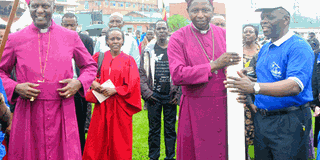Clerics want realistic electoral reforms

Uganda Joint Christian Council secretary Rev Fr Silvester Arinaitwe (R) helps Anglican Archbishop Stanley Ntagali to take the Cross as Kampala Bishop Hannington Mutebi looks on as they prepared to make the Way of The Cross in Kampala last week. PHOTO BY FAISWAL KASIRYE
What you need to know:
Uniting. Clerics under their umbrella body, the Uganda Joint Christian Council back opposition politicians in calling for reforms ahead of 2016.
Kampala.
Clerics in the country have asked government to put in place measures to ensure that the 2016 general elections will be organised and conducted in a free, fair and credible manner to reflect the will of voters.
Under their umbrella body, the Uganda Joint Christian Council, the church leaders called for “meaningful” electoral reforms with a view to levelling the political field to ensure unrestrained competition by all political parties and candidates.
“There is need for dialogue between opposition political parties and the government so that the current undue restriction being imposed on them under the guise of enforcing the Public Order Management Act, 2014, is removed,” the Rev Fr Silvester Arinaitwe, the Council’s executive secretary, said last Friday.
He spoke in Kampala at a press conference to deliver their key message to the nation ahead of Easter Sunday. Fr Arinaitwe suggested that the Electoral Commission should be facilitated to carry out every activity set out in the Election Road Map for 2016 in a timely manner.
UJCC is an ecumenical organisation whose membership comprises the Church of Uganda, the Roman Catholic Church and the Orthodox Church.
“There is need for intra-political party dialogue so that internal wrangles which appear to be simmering among some political parties are resolved in accordance with the provisions of the constitutions of the respective political parties,” Rev Fr Arinaitwe said, adding: “There is need for a code of conduct for political parties and members of the security personnel undertaking duties connected with elections.”
The key electoral issues the churches raised dovetailed with the highlights of the reforms proposed by opposition parties and civil society activists, traversing the country to drum up public support for the ‘Free and Fair Elections Now’ campaign.
Whereas police stopped and roughed up the activists while in eastern Uganda, a follow up meeting between them and Internal Affairs minister Gen Aronda Nyakairima resulted in the exercise going without incident in West Nile and northern Uganda.
On Friday, the Rev Fr Arinaitwe said he was optimistic that government would lead the process of electoral reforms in a manner that will not be driven by partisan political considerations, but the welfare of Ugandans.
The joint statement also condemned rising domestic violence, especially against women, and asked government to quickly develop the guidelines for implementing the Anti-Domestic Violence law that has been ‘gathering dust on the shelves’.
the state says;
While launching the National Identity Card project, President Museveni said the electoral reform proposals were unnecessary because registration of all Ugandans of voting age will help create a data bank to eliminate multiple voting and other electoral frauds as well as related criminal offences.



